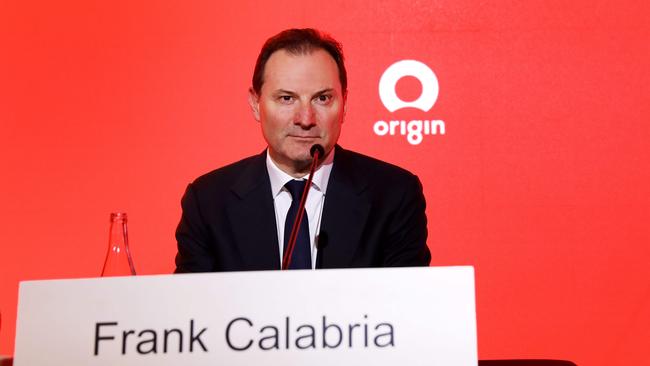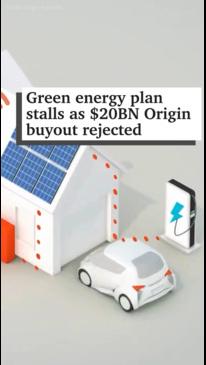Origin tests investors with Octopus spend after $20bn takeover by Brookfield and EIG scuppered
Origin has tipped an extra $530m into British energy retailer and tech platform Octopus Energy, lifting its stake from 20 to 23 per cent.

Origin Energy has tipped an extra £280m ($530m) into UK energy retailer and tech platform Octopus Energy after the collapse of a $20bn takeover deal by Brookfield and EIG Partners.
The Australian electricity giant had been weighing whether to contribute to the next capital raising by Octopus to maintain or increase its 20 per cent stake in the British energy retailer, or prioritise an acceleration of its domestic zero emission generation pipeline after the foreign buyout collapsed.
Origin on Monday announced it had lifted its stake in Octopus to 23 per cent, executed at a pre-money valuation of £5.6bn which represents a 60 per cent increase in the value of Octopus since December 2021.
“The success of Octopus since our initial investment in May 2020 has exceeded all expectations and cemented our belief in its unique capabilities and strong platform for future growth,” Origin CEO Frank Calabria said.
“Acquisition of an increased interest in Octopus reflects Origin’s confidence in its business, strategy, proprietary technology platform and team, and is consistent with our ambition to lead the energy transition through cleaner energy and customer solutions.”

Origin in its communication with shareholders ahead of the vote on the Brookfield and EIG offer confirmed it was considering whether to participate in Octopus’s capital raise. It is understood that as part of the deal with Brookfield, Origin would not participate in the imminent raise. But with the deal now scuppered, Origin has chosen to plough more money into the fast growing UK operator.
Brookfield and EIG’s offer for Origin fell at the final hurdle when less than 69 per cent of shareholders voted to support the deal. The transaction required more than 75 per cent support.
The decision to invest more in Octopus may test its standing with shareholders, with some calling for Australia’s largest electricity and gas retailer to return money to investors and others insisting the company should accelerate its local energy transition ambition.
Octopus, which has grown rapidly to be the UK’s second largest energy retailer and a major player in the licencing of its customer platform worldwide, has proven to be a shrewd investment for Origin.
Octopus was founded in 2016 and has had success with its Kraken customer platform – which it also licenses globally, including to EDF UK and Tokyo Gas.
Octopus said the platform managed about 40 million customers. It aims to have 100 million accounts on the platform by 2027, an ambitious but achievable target.
Origin has pumped more than $700m into Octopus since its initial equity stake purchase in May 2020, and it has been handsomely rewarded. Octopus has emerged as a significant contributor to Origin’s earnings.
“Octopus is in a phase that you don’t typically see – consistent earnings and any profit can be and often is ploughed back into the business,” said one senior energy industry source.

Origin would have been loathe to see its stake in Octopus diluted amid a rush of prominent investors into the business, including Canadian Pension Plan Investments, among the largest private equity investors in the world, and climate campaigner Al Gore’s Generation Investment Management took a 13 per cent stake for $US600m.
An independent expert report into Origin estimated the UK retailer and technology company was worth between $11.25bn and $12.25bn.
Some investors have called on Origin to issue a special dividend, while others – such as Jamie Hannah, VanEck’s deputy head of investments – said it should heighten its renewable energy ambition.
“Coal is shutting down and they have a lot of gas but they need to be in front of the curve so they can ensure they remain in a competitive position in 10 years time,” Mr Hannah said.
“In the medium term, it will hurt the underlying profitability of the company and obviously affect cash flows if they are using it to fund it. But in the long term, if they don’t spend the money then the company is going to put them in a poor position against its competitors. So it really simply has to be invested.”
Origin has pledged to develop 5GW of renewable energy.






To join the conversation, please log in. Don't have an account? Register
Join the conversation, you are commenting as Logout